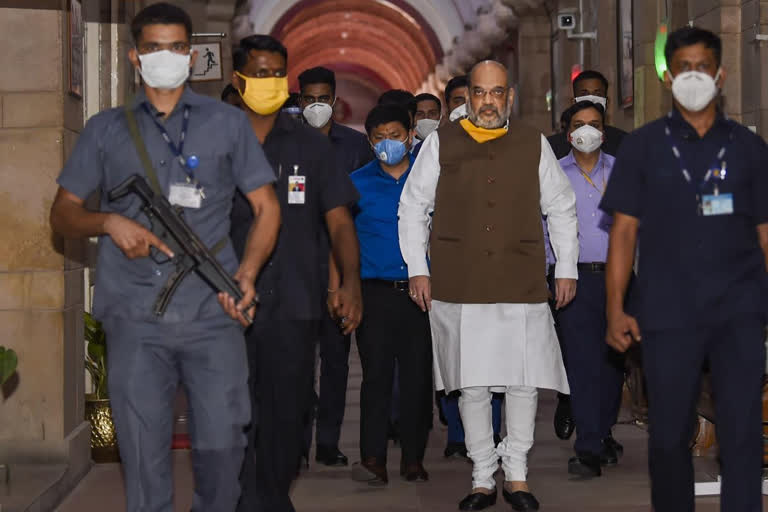New Delhi: Ever since Home Minister Amit Shah did personnel intervention to contain the Covid19 situation in Delhi, the national capital has witnessed a remarkable improvement since then.
"COVID 19 situation in Delhi witnessed a significant improvement. Through the number of cases is close to 1,05,000, the recovery rate is 75 per cent," said Puniya Salila Srivastava, joint secretary in the Home Ministry.
With the number of daily Covid19 cases dropping below 2,500, health experts believe that Delhi may have passed the COVID 19 peak and now heading downwards.
"Delhi was initially doing good. But suddenly there was a huge increase in the number of cases from containment zones. Although the Delhi government have 37 hospitals, 11600 beds, it was found that there was a huge shortage of health care workers. And that is why they requisitioned a large number of the private hospital as COVID hospitals. Subsequently, when the Home Ministry decided to intervene, one thing made very simple. All resources worked together. The equal number of beds are also under the central government," said Dr Giridhar Gyani, a senior health care expert.
He said that central Government resources helped the state government. Earlier, the Delhi government has predicted that the national capital will have more than 5,50,000 cases by July end, however, it's not likely to happen anymore now.
It was on June 14, Home Minister Amit Shah convened the first meeting with all the stakeholders including Delhi Chief Minister Arvind Kejriwal, other ministers and senior Delhi government officials.
Subsequently, Shah convened three more meetings where Chief Minister of Uttar Pradesh Yogi Adityanath, Chief Minister of Haryana Manohar Lal Khattar were also present.
The aim of the Home Ministry was to contain the COVID 19 pandemic not only in Delhi but in the entire National Capital Region (NCR). Such meetings were also able to sort out the scarcity of dedicated COVID hospitals, hospital beds among others, health care workers among other issues.
Following directions from the Home Minister, the Indo Tibetan Border Police (ITBP) along with Delhi government set up a 10,000 bedded COVID care hospital in Delhi. In addition, the Defence Research and Development Organisation (DRDO) has also set up a 1,000 bedded COVID care hospital in justb12 days in the national capital.
Additional 5000 beds have also been managed through 500 railway coaches.
As Shah reviewed the planning to contain COVID 19 situation in Delhi following direction from Prime Minister Narendra Modi, he found shortages of hospital beds but also other medical equipment for doctors and health care workers.
To handle the situation, a committee was set up under the chairmanship of Niti Aayog member Dr VK Paul which later suggested that all hospitals should announce the capacity in the particular hospital to fight COVID like availability of beds etc.
Significantly, as suggested by the VK Paul committee the cost of treatment in private hospitals has also been capped between Rs 8000 and Rs 18,000, the maximum being for patients requiring admissions in the ICU along with a ventilator.
In addition, Shah has also set up a unified command in the home ministry to oversee work done by local authorities in NCR.
The intervention made by Shah also ramped up the testing in Delhi with more than 20,000 tests being done daily, much large in comparison from the previous 6,000 testings per day.
ALSO READ: Rajnath holds telephonic conversation with South Korean counterpart
While 2.9 lakh people were tested in Delhi between April 1 to June 14, as many as 2.4 lakh people have been tested between June 15 to June 30. Though the national capital registered a stable fatality rate since the beginning, the daily cases, however, witnessed a sharp improvement.
After reaching a peak on June 23, when 3,947 new infections were detected in Delhi, there has been a sharp decline in the number of cases every day. Interestingly, people who had been found infected two to three weeks ago, have also been recovering.
Costs of testing in private labs have also been capped at Rs 2,400 from the previous Rs 4,500.
As directed by Shah, India's apex medical research institute (ICMR) has carried serosurvey in 11 districts from June 27 to July 5 during which 22,000 samples have been collected from.
The serosurvey has reportedly found that 15 per cent of Delhi's population has been infected by Covid19. The intervention made by Shah has also ensured supply 500 oxygen cylinders, 440 ventilators, 10,000 oxy-meters and adequate ambulances.
Shah has also asked all the hospitals in Delhi to install CCTV camera apart from releasing the dead bodies to the relatives for last rites. Significantly, political parties in Delhi have also started claiming credit for such improvements.
Many of the social media users, claimed that it was only after the central government's intervention that the situation has been improved. The ruling party in Delhi, AAP, however, has another opinion.
"We have taken support from the central government but the situation has been developed because of our sincere efforts," said Nitesh Pandey, a senior Aam Admi Party leader.
He, however, said that in this situation both the Delhi government and Central government worked together. Health experts Gyani said that obviously political parties might try to claim the credit.
"However, management of COVID patient is a difficult task and it worsened in Delhi due to the sudden increase of cases...The coordination of two Government (Delhi and Central government) made things better. However, we should not bring political angle into this...If I look at the Home Minister and Chief Minister, I don't think they made any claim," said Dr Gyani.
ALSO READ | LAC standoff: India expects China to ensure expeditious restoration of peace



